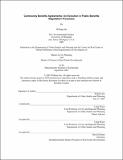Community Benefits Agreements : an evolution in public benefits negotiation processes
Author(s)
Ho, William (William Hy)
DownloadFull printable version (6.978Mb)
Alternative title
Evolution in public benefits negotiation processes
Other Contributors
Massachusetts Institute of Technology. Dept. of Urban Studies and Planning.
Advisor
Lang Keys.
Terms of use
Metadata
Show full item recordAbstract
Urban redevelopment projects involve three parties: (1) the public sector (e.g. public officials), (2) the private sector (e.g. developers), and (3) the community (e.g. residents and community groups). Traditionally, decision-making power in urban redevelopment projects resided between the public and private sectors, with little authority given to communities. The development of Community Benefits Agreements (CBAs) were a reaction to this imbalance and have helped communities gain influence in the redevelopment process. These agreements are "legally" binding contracts between a developer and community group(s) - to ensure that development projects benefit local community residents. Their creation is rooted in several decades of failed urban policies and the public learning that has taken place since Urban Renewal. CBAs first appeared in Los Angeles in 2001 and have since taken root across the country in such geographically diverse places as Denver, Milwaukee, and New York City. These agreements represent a significant evolution in collective bargaining, the ability of varied entities to come together and take a common position on a topic, and the ability of communities to secure benefits from developers. This thesis examines why these agreements came into existence, the process by which they are implemented, and how they have been employed. It will look at how these agreements have created greater overall value for all three sectors involved in publicly subsidized redevelopment projects and how to improve upon the community benefits negotiation process.
Description
Thesis (M.C.P. and S.M.)--Massachusetts Institute of Technology, Dept. of Urban Studies and Planning, 2007. This electronic version was submitted by the student author. The certified thesis is available in the Institute Archives and Special Collections. Includes bibliographical references (p. 84-86).
Date issued
2007Department
Massachusetts Institute of Technology. Department of Urban Studies and PlanningPublisher
Massachusetts Institute of Technology
Keywords
Urban Studies and Planning.